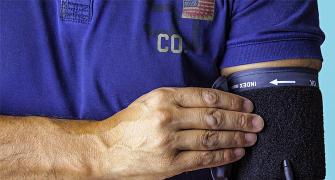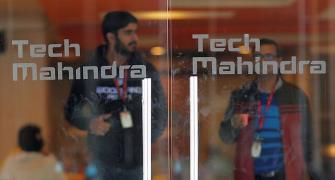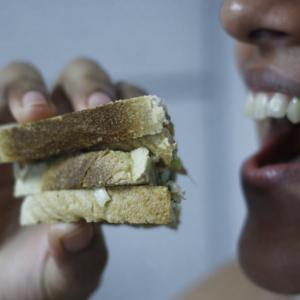Superfoods like low carb veggies and fatty fish will help diabetics keep their sugar under check, says diabetologist Dr Nikhil Nassikar.

Photograph: Kind courtesy Vicky Stark/Instagram
When you have Type 2 diabetes, what you eat can help you regulate your blood sugar, stave off hunger, and make you feel full longer.
Diabetes is when your blood sugar (glucose levels) is higher than normal. Carbohydrate foods like breads, cereals, rice, desserts, etc., can cause this rise.
Your eating plan should pay attention to the amount and type of carbs you eat through the day.
It is also important that you have foods you enjoy so you feel satisfied and avoid overeating.
In addition to just reducing carbohydrate consumption, there are several other foods that experts recommend as potentially helpful to those with Type 2 diabetes.
A fibre-rich diet can help reduce one’s risk of diabetes by improving blood sugar control as also aid in weight loss and overall health.
Benefit by enjoying lots of fruits, vegetables, beans and whole grains. Here are some foods that can keep your blood sugar in check and make you happy and healthy.
Raw, Cooked or Roasted Vegetables
These add colour, flavour and texture to a meal. Choose tasty, low-carb veggies like onions, eggplants, tomatoes, mushrooms, etc.
Greens
Going beyond the regular salad, try kale, spinach, etc. They’re healthy, delicious and low-carb.
Roast a few kale leaves in the oven with olive oil for crunchy chips. You can also add greens to roasted veggies for texture and a different flavor.
Low-caloried, flavorful, drinks — While plain water is always good, water infused with fruits and vegetables is more interesting.
Cut a lemon or cucumber and put it in water with some flavouring.
You can also try cold tea with lemon or a cinnamon stick.
These beverages are not only low-carb, they can also help in filling you up so that you don’t crave for other foods.
Whole-grain, high-fibre foods
Fill up on these to avoid overeating or going in for the wrong foods.
Try pulses like dried beans, peas and lentils. These still have carbs, but with interesting flavors they help keep you satisfied.
A little fat
Ideal fat choices include olive oil, avocado and fatty fish -- for example salmon served on a bed of lettuce.
Peanut butter on a celery stick is a good fat and protein mix for a healthy, satisfying snack.
Greek yogurt, cottage cheese, eggs and lean meats are a storehouse of proteins.
Apple Cider Vinegar
A couple of spoons of vinegar before a meal can help manage blood sugar levels.
A study at Arizona State University found that when diabetics consumed two spoons of vinegar before two meals each day, there was a significant reduction in postprandial insulin sensitivity, compared to the group that did not consume vinegar.
Avocado
Its high amount of monounsaturated fat and low sugar content sets it apart from other fruits. Such fat can subdue blood cholesterol levels and slow the absorption of other sugars.
Black beans
They are full of fortifying fiber and protein, and therefore, they have a low glycemic index value.
Their flexibility allows them to be easily incorporated into a number of dishes. Diabetics ought to always keep a few cans in the cupboard.
Chamomile Tea
A study at the Journal of Agricultural and Food Chemistry showed that chamomile tea may be effective in regulating blood sugar.
When diabetic rats were given a dose of chamomile for three weeks, they showed an overall decrease in blood glucose levels.
Cinnamon
A study found that including half a teaspoon of cinnamon in one’s daily diet has the ability to make cells more responsive to insulin.
The study found a reduction in blood-sugar spikes after taking varying quantities of cinnamon extract over a 40-day period.
Greens may be good for you, but the nutrients in iceberg lettuce may not be as abundant as those in kale or spinach.
Apart from nutrient content, the glycemic index (GI) of a food may also help in making healthy choices.
The GI indicates how quickly a food will raise blood sugar levels. Foods with low GI have a score of less than 55, while foods with high GI have a score of 70 or more.
A baked potato has a GI of 85 which is quite high among vegetables. Excepting potatoes, most vegetables have a low GI. For example, the following vegetables have a low GI:
- Carrots: 35
- Green peas: 51
- Yam: 54
Low-carbohydrate fruits can help control appetite, delay hunger pangs, and help you achieve your weight. The following fruits have a low GI:
- Apples: 39
- Pears: 38
- Oranges: 40
Generally, lower GI foods are a healthier choice for people with diabetes.
Foods that are nutritious and also having a low GI are helpful in managing health and blood glucose levels.
Finding a balance
If a fruit or vegetable has a high GI, it doesn’t mean you should refrain from eating it altogether.
When you consume a meal that has protein, fats and low and high GI foods, digestion of the food that has a high GI slows down.
If you eat a baked potato for dinner, balance the meal with a food that has a low GI, such as broccoli or fish, and healthy fat, such as an avocado.
Avoid having large portions of foods with a high GI.
Some of the foods that have low GI scores and are part of a healthy diet are:
- Whole grain breads
- Beans
- Pulses
- Fruits
- Vegetables
- Low-fat dairy products
Advantages of a low-glycemic diet
If you have diabetes, a low-glycemic diet can help manage your condition better.
A low-glycemic diet can:
- Improve your cholesterol levels
- Reduce your risk of developing heart disease
- Help you stay full longer
- Increase your energy levels
People with Type 2 diabetes which is the most common form of the disease, characterised by resistance to insulin (crucial for a healthy metabolism) and high blood sugar levels -- depend on such medications as Glucophage (metformin) to control the condition.
There is some debate among doctors and nutritionists as to the long-term effectiveness of diet on diabetes, but a growing body of evidence suggests that a regimen of high-fiber, low-carbohydrate foods, providing the body with a stable and steady stream of energy, can help blunt dramatic spikes in blood sugar and can also eventually lead to less of a reliance on medication.
 Lead image published only for representational purposes.
Lead image published only for representational purposes.
The author Dr Nikhil Nassikar is consultant diabetologist at K J Somaiya Hospital, Super Specialty Centre.









